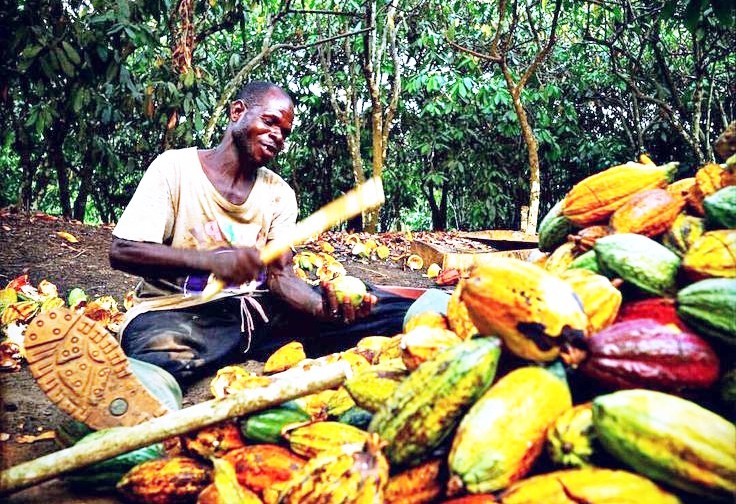
Many Ghanaian farmers believe that there appears to be a discrepancy between the actual cocoa producer prices announced for the 2025–2026 season in Ghana and the expectations set by President John Dramani Mahama’s promises. As a result, the majority of farmers and stakeholders are not happy.
Beginning in the 2025–2026 season, cocoa growers will get 70% of the global market price for their crop, according to a pledge made by President Mahama during his campaign and post-election trips. Farmers had higher hopes as a result of this widely reported commitment. By raising the producer price to US$5,040 per tonne, or 70% of the Free-On-Board (FOB) value of US$7,200 per tonne, the government kept its word.
However, given that global cocoa prices peaked earlier in 2025 at over US$11,000 per tonne, some farmers and stakeholders, such as the Ghana National Cocoa Farmers Association and the Minority in Parliament, contend that the new price (GH¢3,228.75 per 64kg bag) falls short of their expectations of GH¢4,500–7,000 per bag. Perceptions of underdelivery have resulted from the discrepancy between these expectations and the price that was announced.
The new producer price, which is GH¢3,635 a bag—roughly GH¢407 more than Ghana’s price—is lower than what farmers in Côte d’Ivoire are reportedly receiving, the minority in parliament has warned. As farmers look for higher profits, this disparity may encourage the smuggling of cocoa across international borders. Farmers’ discontent with the government’s pricing has increased as a result of their concern of losing cocoa to neighboring countries because of reduced prices in the region.
Critics contend that the substantial 62.58% increase from US$3,100 to US$5,040 per tonne does not accurately reflect the state of the market. Due to supply difficulties, cocoa prices have fluctuated globally, peaking above US$11,000 in the past and currently fluctuating between US$8,100 and US$8,300 per tonne as of August 2025.
In order to account for increased production costs, inflation, and the high pricing on the global market, farmers and advocacy groups, such the Eastern Women Cocoa Farmers’ Cooperative, have lobbied for prices as high as GH¢4,500–5,000 per bag (or even GH¢6,000–7,000 per bag by some estimates). Customers are unhappy since the stated price, which is roughly US$476 per bag, does not meet these expectations.
According to posts on X, some stakeholders have stated that farmers will not see any appreciable real-world benefits from the price hike. For example, the Minority in Parliament claims that although if the 70% FOB pledge was fulfilled, the real increase in local currency (GH¢3,228.75 per bag) is only a 4.2% gain over the GH¢3,100 per bag from the previous season. There are feelings that the government is not doing enough because of this slight rise as well as the high cost of living and inputs.
The idea that the price increase does not sufficiently address farmers’ economic realities has been strengthened by critics such as Hamza Suhuyini, a member of the NDC Communications Team, who has admitted that “farmers demand more.”
Some farmers and analysts have expressed concerns about the lack of clarity on how the 70% FOB value is calculated and implemented. The reliance on forward contracts, which lock in prices well before market highs, limits farmers’ ability to benefit from global price spikes. Additionally, there has been criticism about inadequate publicity and engagement with farmers to explain the new pricing structure, as noted in posts on X. This lack of effective communication may contribute to feelings of mistrust or disappointment.
Farmers have long faced issues like low farmgate prices, high input costs, and inadequate support, which Mahama acknowledged during his campaign. While the government has introduced measures like free fertilizer programs, hybrid seedling distribution, and infrastructure improvements, some farmers may feel these initiatives are not enough to offset the pricing shortfall or address deeper systemic issues like ageing farms and environmental challenges. The perception that the government has not fully tackled these longstanding grievances adds to the discontent.
The Mahama administration has emphasized that the US$5,040 per tonne price is the highest in years and aligns with the 70% FOB promise, a significant improvement from the 63.9% share (US$3,100 of US$4,850 FOB) under the previous administration. Additional initiatives, such as the Cocoa Rehabilitation and Youth Entrepreneurship Programme, free fertilizer distribution, and infrastructure projects like the Juaboso–Asawinso road, aim to support farmers beyond pricing.
The government has highlighted challenges like currency volatility and public debt, which may limit its ability to offer higher prices without risking fiscal stability. The price increase also accounts for a stronger cedi and lower inflation, which the government argues makes the adjustment more impactful in real terms.
Ghana Cocoa Board In Agreement With Bühler
Some Ghanaians, as seen in social media posts, have praised the price hike as a step forward, with supporters like Dr. Randy Abbey, COCOBOD CEO, defending it as fulfilling Mahama’s manifesto pledge.
While President Mahama’s administration has implemented a significant cocoa price increase to US$5,040 per tonne (GH¢3,228.75 per bag) for the 2025/2026 season, fulfilling the 70% FOB value promise, some farmers remain unhappy due to the gap between their expectations (GH¢4,500–7,000 per bag) and the announced price, comparisons with higher prices in Côte d’Ivoire, and the marginal real-world gains amidst high production costs and global market highs.
Concerns about transparency, smuggling risks, and insufficient communication further fuel dissatisfaction. However, the government’s broader reforms and support programs suggest an attempt to address these issues holistically, though their impact may not yet fully satisfy farmers’ demands.





